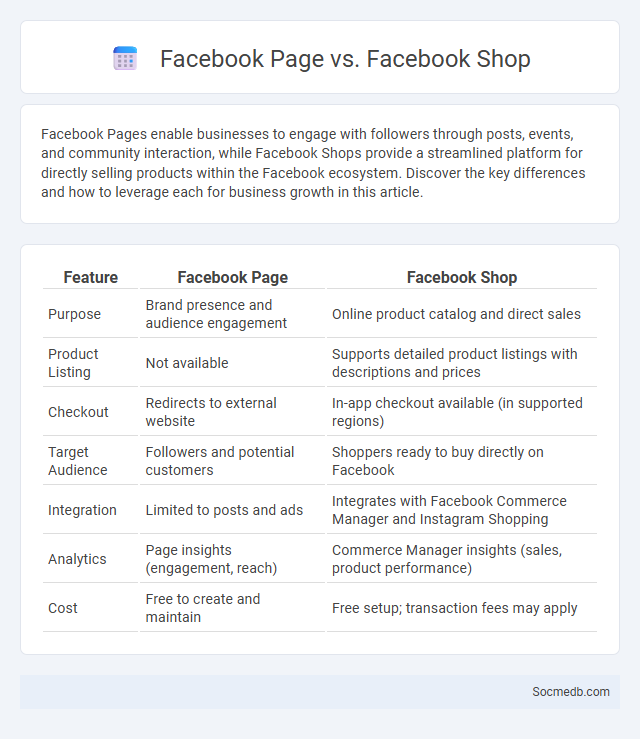
Photo illustration: Facebook Page vs Facebook Shop
Facebook Pages enable businesses to engage with followers through posts, events, and community interaction, while Facebook Shops provide a streamlined platform for directly selling products within the Facebook ecosystem. Discover the key differences and how to leverage each for business growth in this article.
Table of Comparison
| Feature | Facebook Page | Facebook Shop |
|---|---|---|
| Purpose | Brand presence and audience engagement | Online product catalog and direct sales |
| Product Listing | Not available | Supports detailed product listings with descriptions and prices |
| Checkout | Redirects to external website | In-app checkout available (in supported regions) |
| Target Audience | Followers and potential customers | Shoppers ready to buy directly on Facebook |
| Integration | Limited to posts and ads | Integrates with Facebook Commerce Manager and Instagram Shopping |
| Analytics | Page insights (engagement, reach) | Commerce Manager insights (sales, product performance) |
| Cost | Free to create and maintain | Free setup; transaction fees may apply |
Introduction to Facebook Ecosystem
Facebook Ecosystem encompasses a vast network of applications and services including Facebook, Instagram, WhatsApp, and Messenger, designed to connect over 3 billion users globally. Your engagement within this ecosystem enables seamless communication, content sharing, and personalized advertising driven by advanced algorithms. Understanding its interconnected platforms empowers you to maximize social reach and digital marketing effectiveness.
What is a Facebook Page?
A Facebook Page is a public profile created for businesses, brands, celebrities, organizations, or causes to connect with their audience on Facebook. It offers tools for sharing updates, posting photos and videos, running advertisements, and engaging with followers through comments and messages. Designed to build brand presence and foster community interaction, Facebook Pages provide valuable insights through analytics to track audience engagement and growth.
What is a Facebook Shop?
A Facebook Shop is an integrated e-commerce platform within Facebook that allows businesses to create a customizable online storefront directly on their Facebook Page. It enables seamless product listing, inventory management, and direct purchasing options, enhancing customer reach and engagement on the social media network. With features like personalized collections and dynamic ads, Facebook Shops streamline the shopping experience for both sellers and buyers.
Differences Between Facebook Page and Facebook Shop
Facebook Page serves as a brand's primary profile for sharing updates, engaging with followers, and building community, while Facebook Shop is designed specifically for e-commerce, enabling direct product listings and purchases within the platform. Your Facebook Page drives brand awareness and customer interaction through posts, events, and messaging, whereas Facebook Shop provides an integrated storefront experience with product catalogs, pricing, and checkout options. Choosing between a Facebook Page and Facebook Shop depends on whether your goal is community engagement or facilitating online sales.
Facebook Page vs. Facebook Shop: Core Features
Facebook Page offers your business a platform to share posts, engage with followers through comments and messages, and provide essential information like contact details and hours. Facebook Shop integrates seamlessly with the page to showcase products directly, enabling customers to browse, save, and purchase items without leaving Facebook. Your choice depends on whether you prioritize community interaction with a Facebook Page or streamlined e-commerce through a Facebook Shop.
Benefits of Using a Facebook Page
Creating a Facebook Page enhances your brand visibility by connecting with millions of active users daily, allowing you to reach a targeted audience efficiently. Your page provides valuable insights through Facebook Analytics, helping you understand customer behavior and optimize your marketing strategy. Engaging content and direct communication foster stronger relationships with your audience, driving increased loyalty and sales.
Benefits of Setting Up a Facebook Shop
Setting up a Facebook Shop provides your business with a streamlined platform to showcase products directly to over 2.9 billion active users, enhancing visibility and driving sales. By integrating with your existing e-commerce systems, it enables seamless inventory management and offers personalized shopping experiences through targeted ads and customer interaction. Your Facebook Shop also facilitates convenient in-app purchasing, reducing friction in the buying process and boosting customer retention.
Facebook Page vs. Profile: Key Distinctions
A Facebook Page is designed for businesses, brands, and public figures to connect with a broad audience, offering analytics, advertising options, and multiple admin roles to manage engagement effectively. Your Facebook Profile serves as a personal account to share life updates, photos, and interact primarily with friends and family, with privacy settings tailored for personal use. Understanding these key distinctions helps you choose the right format to maximize your online presence and engagement goals.
Which is Better for Your Business: Page or Shop?
Choosing between a social media Page and Shop depends on Your business goals and audience engagement. A Page offers a platform to build brand awareness, share updates, and interact with followers, making it ideal for service-oriented businesses or those seeking customer relationships. In contrast, a Shop integrates e-commerce features, enabling direct sales and product showcases, which benefits retail businesses aiming to streamline their online shopping experience.
Conclusion: Choosing the Right Facebook Tool
Selecting the right Facebook tool significantly impacts your ability to manage content, engage audiences, and analyze performance efficiently. Your choice should align with your specific goals, whether it's enhancing post scheduling, advertising, or customer interaction. Prioritizing tools with robust analytics and user-friendly interfaces ensures you maximize your social media strategy's effectiveness.
 socmedb.com
socmedb.com